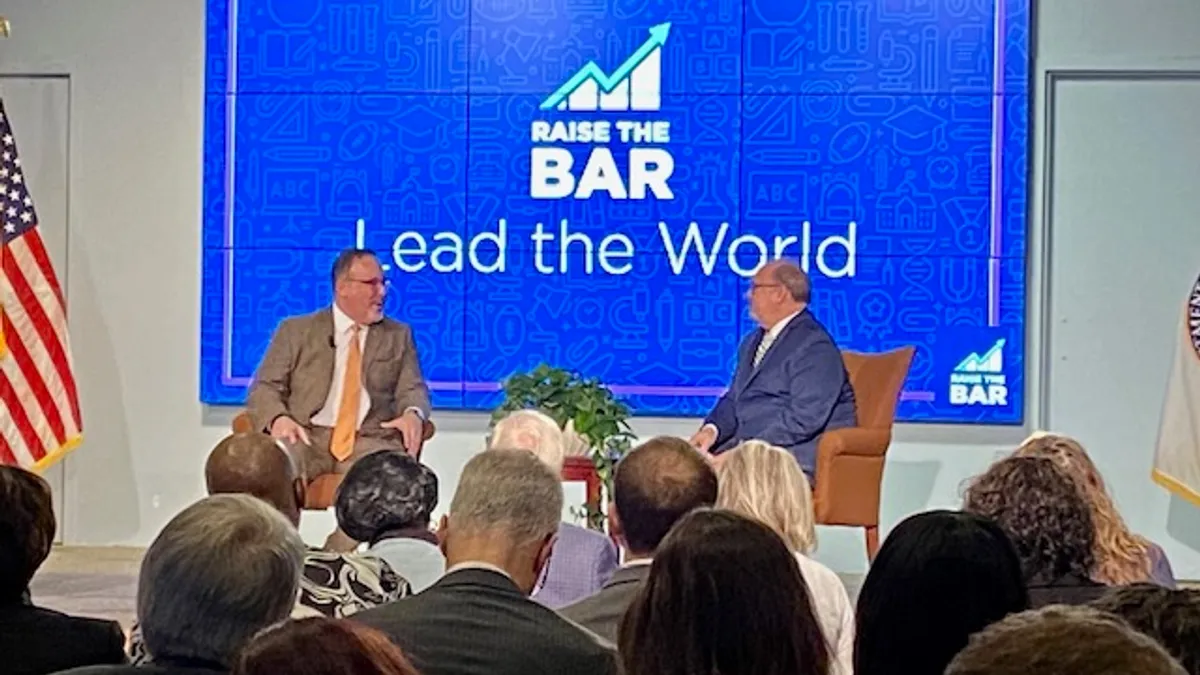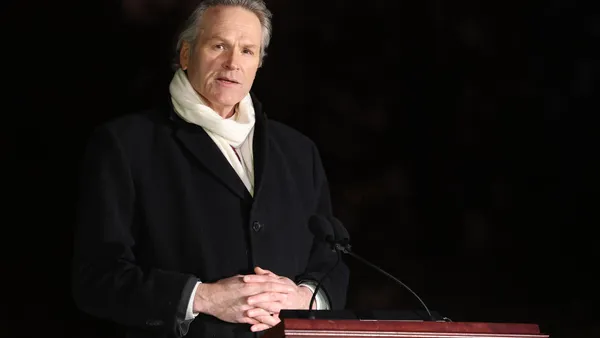Dive Brief:
- U.S. Education Secretary Miguel Cardona called on educators to set higher expectations for students in reading and math achievement, as well as provide greater opportunities for students to learn multiple languages, during a speech Tuesday at the Education Department.
- His speech, which had the theme "Raise the Bar," also encouraged the expansion of career pathways, a focus on student well-being, and sustained funding to continue "transformative change" started with federal COVID-19 emergency funds.
- In his speech and a follow-up fireside chat with National PTA Executive Director Nathan Monell, Cardona also emphasized the need for supporting teachers with competitive pay and for authentic engagement with parents.
Dive Insight:
Held in the Education Department's Lyndon Baines Johnson Auditorium, the event looked and felt different from a similar presentation last January. People were seated closer together and lively music from the “Encanto” movie soundtrack played before the speech.
But the seriousness surrounding the struggles schools are facing regarding academic recovery, teacher shortages and school safety remained the same.
Saying he wasn't going to offer "any shiny new initiatives today" and that the Biden administration is about "substance, not sensationalism," Cardona laid out three main focus areas for enhancing student outcomes during his 20-minute speech:
- Achieve academic excellence. On the most recent Programme for International Student Assessment, the U.S. placed 36th out of 79 countries for math, he said.
"That’s unacceptable," Cardona said. "We must do better. We must act like our national security depends on it."
To strengthen academic rigor and outcomes, Cardona called for high standards for instructional materials, an expansion and enhancement of early childhood education, and expanded preparation for high-level math courses and instruction in decoding skills for reading. - Improve learning environments. This includes a focus on student mental health supports and overall well-being. Cardona pointed to increased funding for Full-Service Community Schools and dedicated money from the Bipartisan Safer Communities Act as opportunities to improve services to meet student needs.
Some promising practices Cardona said he heard about during community visits include reduced counselor-to-student ratios, district partnerships with hospitals and local healthcare organizations, and educator professional development around trauma-informed practices. - Create pathways for global engagement. Cardona said he wants to see an increase in multilingualism in schools, with more opportunities for bilingual and dual language courses and a recognition of high school graduates who learn multiple languages.
"Let’s look at our students in bilingual programs as gifted, with assets that we want other students to have," he said.
In this area, Cardona also called for college dual enrollment programs to start in 11th grade so "ambitious high schoolers can graduate with an associate’s degree or credential without paying a penny."
The Education Department, along with the U.S. Labor and Commerce departments rolled out a new initiative and guidance late last year to expand work-based learning opportunities for students.
Cardona spoke of the need to bring more attention and transparency to what he called the "teacher tax," or data showing teachers earn less than other professionals with college degrees. In many states, mid-career teachers qualify for state welfare assistance, he said.
He pointed to his administration's efforts to reduce student loan debt as one approach that would help reduce teacher shortages. Improved career opportunities for teachers to become master teachers and leaders, and seeking teacher input for policy development, are other strategies, he said.
"From my experience as a teacher and as a father, I know the teaching profession changes lives. It’s a profession that makes all other professions possible," Cardona said.







 Dive Awards
Dive Awards







